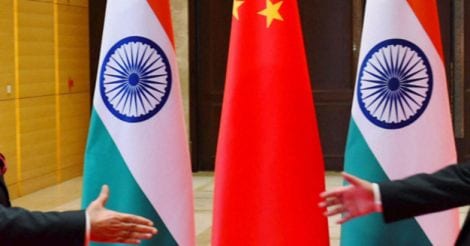Washington: The Pentagon has encouraged India and China to engage in a direct dialogue free of any "coercive aspects".
"We encourage India and China to engage in direct dialogue aimed at reducing tensions and free of any coercive aspects," Gary Ross, a defense department spokesman told PTI.
Over the past week, the US State Department too have been making similar statements, but Pentagon has sought direct talks between India and China on reducing tension "free of any coercive aspects".
Notably, in recent past, almost all the Chinese neighbors have been accusing Beijing of coercive tactics to settle border disputes.
The month-long India-China border standoff in the Sikkim sector is seen as part of same Chinese coercive tactics to change the status quo. India has taken a strong stand against such a Chinese move.
National security adviser Ajit Doval heads to Beijing to attend a meeting of BRICS later this month. During his visit, Doval is expected to talk with his Chinese counterpart on this issue.
Responding to questions, the Pentagon refused to take sides on the issue.
US keeping watch
The US is "closely and carefully" following the border standoff between India and China, the Trump administration said Friday, urging the two countries to engage in direct dialogue to reduce the tension.
The remarks came a day after India and China appeared willing to resolve the military standoff through dialogue.
External affairs minister Sushma Swaraj told the Rajya Sabha that India was willing to talk to China on the standoff in Sikkim sector, "but both sides have to first take back their armies." She said the boundaries between the countries are not yet finalized and it will be done bilaterally through discussions.
In Beijing, China's foreign ministry said that diplomatic channels with India remained "unimpeded". It, however, reiterated that the withdrawal of the Indian troops from Doklam area is a "precondition" for any meaningful dialogue.
"This is a situation that we are following closely and carefully," state department spokeswoman Heather Nauert said.
"I'd have to refer you to the governments of India and China for more information on that," she told reporters and added that Indian and China were talking on the issue.
Referring to the visit of India's National Security adviser Ajit K. Doval to Beijing for a meeting of the NSAs from BRICS countries on July 27-28, Nauert said: "They're going to talk to one another."
"We would encourage them to engage in direct dialogue aimed at reducing the tension," Nauert added.
Chinese and Indian soldiers have been locked in a face- off in Doklam area in the southernmost part of Tibet for over a month after Indian troops stopped the Chinese army from building a road, fearing it may allow China to cut India's access to its northeastern states.
India has conveyed to China that the construction of the road would represent a significant change of status quo with serious security implications for New Delhi.
India and China share a 220-km-long border in Sikkim.
Read more: Latest World news | White House spokesman Sean Spicer resigns

























 Representational image
Representational image